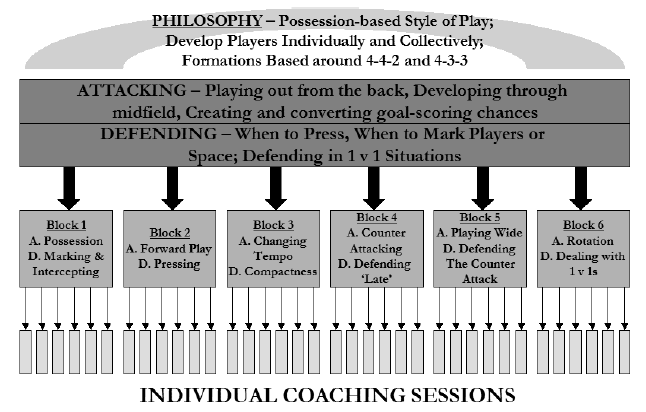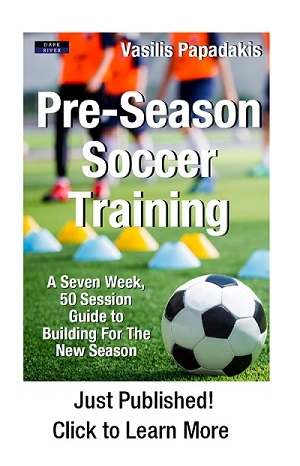From the outstanding soccer coaching book:
Dan Wright – Coaching Philosophy
“To me a coaching philosophy means how you view the game; your core values and beliefs.
I first started writing my philosophy in 2008 when I started my UEFA ‘B’ License. Until then I had an understanding of how I thought I wanted the game to be played but found it very difficult to articulate. My tutor said his outlook was as simple as “Player First, Player Centred, and Results Second.” For me this was a great approach to coaching youth soccer but told you everything and nothing. It was a bit of a riddle. There was no talk of how and lacked personality.
It has to be your philosophy … not Guardiola’s, or Barca’s, or Germany’s or Cruyff’s. It must be how you see the game, how you want your players to play, and how you are going to achieve it. This gives you and your players an identity.
I have recently re-written my philosophy and it’s over 50 slides long! It discusses position-specific roles, player-coach relationships, creating the right environment, the demands of the game, my core values and everything that has shaped my outlook on the game. It is 50 slides before we discuss session plans. However, my overall aim is to produce technically proficient players, who understand the game and make good decisions.
I understand there are many different ways to play soccer – that is what makes it great. Whilst I have clear and defined opinions on the game, I always listen to others. Be prepared to have an opinion, to know why you think what you do, but know that the game is always changing and your philosophy may evolve with time and experience. As a coach you are never the finished article.”
US Soccer offers an easy-to use document to assist coaches when trying to develop their own philosophy, basing this around four key areas – the coach’s beliefs, motivation, experiences and methods. I have shared some of the questions they ask below.
US Youth Soccer – Philosophy Questionnaire
1. BELIEFS
- Why do you want to be a youth coach?
- Why do we have youth soccer?
- What are your responsibilities? To each player, to the team, to yourself and to the community?
- Define a successful season.
2. MOTIVATION
- I am interested in coaching because…
- What do you enjoy most about coaching?
- What do you like least about coaching?
3. EXPERIENCES
- PAST – what were your personal childhood experiences in soccer? Was it enriching or inhibiting?
- PRESENT – self-evaluation – what are you doing now?
- FUTURE – what experiences will I seek to improve my coaching?
4. METHODS
- What is my coaching style?
- At what point will I involve the players in the decision making process? Pre-, During, Post-Practice?
*
Are you a soccer coach? We have more than 25 titles currently available.
*
Macro, Meso, Micro
Once the overarching coaching philosophy is formed, the coach can then start to plan his team’s long (macro), medium (meso) and short-term (micro) objectives.
Macro Objectives – The coaching syllabus, usually yearly (although possibly more if the club is well organized and connected), is devised based on the coach’s philosophy.
Meso Cycle – The syllabus can then be broken down into a number of blocks of work, where for a certain period of time, players are taught around one or two particular topics. This period of time is usually from two to six weeks depending on the amount of contact time with the players.
Micro Cycle – Once the syllabus and blocks of work are in place, the individual coaching sessions are conceived.
The syllabus below brings the content of a previous diagram to life. This is taken from a “Women’s Premier League Top Four Club” and is adapted from a presentation by Ben Bartlett, the founder of www.integritysoccer.co.uk. The full, detailed syllabus and presentation is available online.
Sample Philosophy

Stifling Creativity?
There is a school of thought that suggests devising a syllabus, and working rigidly towards it, actually stifles the creativity of both coaches and players. Although I understand these concerns, I do not necessarily agree fully with them. I believe an adaptable syllabus, which is used as a working document, rather than a restrictive document, is key. In that way you balance the logic of periodized coaching, while leaving room for episodic coaching and working towards the changing needs of your players.
*
*
Syllabi and Session Plans in Action
During the remainder of this chapter I will offer you various examples of syllabi and session plans and session plan templates from clubs, colleges, and professional academies all over the world. Like in the previous chapter, we will use the age-defined nature of the Long Term Player Development Model.
Stage 1 – The FUNdamental Phase
Ages 5 – 8 +/-
From the previous chapter, we noted that the focus of working with this age group is about exploring and discovering the game, developing movement skills, and helping young players fall in love with the game.
Sample Syllabus / Block of Work 5 – 8 Year Olds
Developing a syllabus for the five to eight-year-old age group is not an easy one. Considering the natural characteristics of these children, only a very basic coaching program can be designed and enforced. One of the most simplistic yet effective academy programs I have seen comes from a club playing in the English Championship. Although the club’s first team is not in the Premier League, the academy has an excellent track record in producing players who have played at the highest level internationally, commanding transfer fees into the millions of pounds.
The syllabus runs over one season of 38 weeks. During each week, there is a slightly different technical, tactical, physical and psychological focus. As these players are too young for tactics, this work simply involves “playing out from the back” and “through the thirds” which evolves from the club’s possession-based philosophy. The psychological elements are simply based around confidence, commitment and emotional control.
The academy recognizes the importance, however, of concentrating more on the technical and physical development of the players. A breakdown of what type of work involved is below:
Renowned English Academy Breakdown of Technical Syllabus for 5 – 8 year olds


Sample Session Plan 5 – 8 Year Olds
The session plan below is taken from the syllabus of an Italian Academy, adapted from the book Youth Academy Training Program – New Methodology From Italian Serie ‘A’ Coaches. Each session involves five activities over three phases.

Stage 2 – The Learning to Train Phase
Ages 8 – 11 +/-
We remember, from the last chapter, that players at this age are living through their Golden Age of Learning. They have the ability to absorb lots of technical and physical improvement.
Sample Syllabus / Block of Work 8 – 11 Year Olds
The block of work below is a 12-week syllabus for players up to twelve years old and is taken from The Football Coaches Library. Although this is not from a famous academy, I like this example as, not only does each week have a specific focus, each week also links with the previous one, creating a solid, linked program of work. By linking topics with each other, it commits more to the players’ long-term learning. So rather than jumping, for example, from defending to dribbling to possession, it works logically through topics, starting with basic understanding, then increasing the complexity.

*




